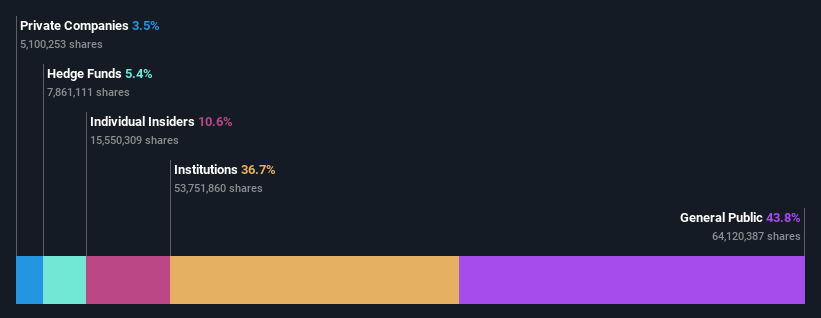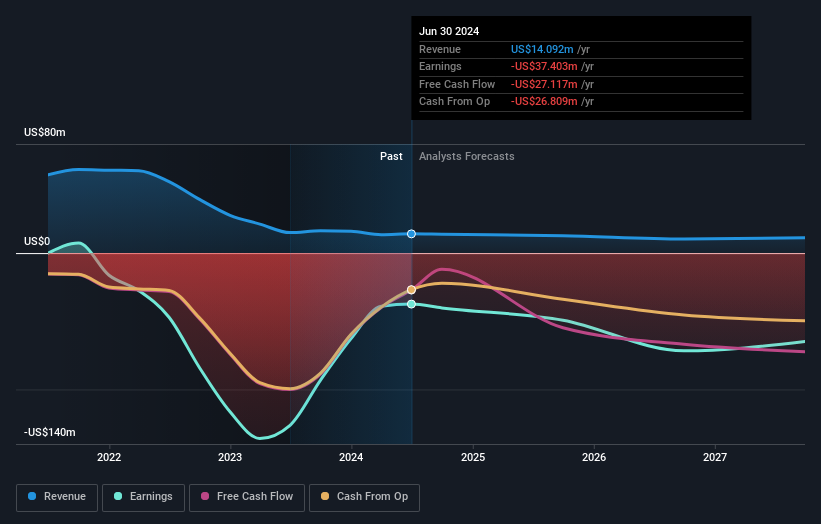- United States
- /
- Personal Products
- /
- NasdaqCM:VERU
Institutions along with retail investors who hold considerable shares inVeru Inc. (NASDAQ:VERU) come under pressure; lose 11% of holdings value

Key Insights
- Veru's significant retail investors ownership suggests that the key decisions are influenced by shareholders from the larger public
- A total of 16 investors have a majority stake in the company with 50% ownership
- Insider ownership in Veru is 11%
Every investor in Veru Inc. (NASDAQ:VERU) should be aware of the most powerful shareholder groups. And the group that holds the biggest piece of the pie are retail investors with 44% ownership. Put another way, the group faces the maximum upside potential (or downside risk).
While the holdings of retail investors took a hit after last week’s 11% price drop, institutions with their 37% holdings also suffered.
Let's delve deeper into each type of owner of Veru, beginning with the chart below.
Check out our latest analysis for Veru

What Does The Institutional Ownership Tell Us About Veru?
Institutions typically measure themselves against a benchmark when reporting to their own investors, so they often become more enthusiastic about a stock once it's included in a major index. We would expect most companies to have some institutions on the register, especially if they are growing.
As you can see, institutional investors have a fair amount of stake in Veru. This can indicate that the company has a certain degree of credibility in the investment community. However, it is best to be wary of relying on the supposed validation that comes with institutional investors. They too, get it wrong sometimes. If multiple institutions change their view on a stock at the same time, you could see the share price drop fast. It's therefore worth looking at Veru's earnings history below. Of course, the future is what really matters.

Our data indicates that hedge funds own 5.4% of Veru. That worth noting, since hedge funds are often quite active investors, who may try to influence management. Many want to see value creation (and a higher share price) in the short term or medium term. Our data shows that BlackRock, Inc. is the largest shareholder with 5.6% of shares outstanding. For context, the second largest shareholder holds about 5.5% of the shares outstanding, followed by an ownership of 5.4% by the third-largest shareholder. Harry Fisch, who is the second-largest shareholder, also happens to hold the title of Senior Key Executive. Furthermore, CEO Mitchell Steiner is the owner of 4.8% of the company's shares.
After doing some more digging, we found that the top 16 have the combined ownership of 50% in the company, suggesting that no single shareholder has significant control over the company.
While studying institutional ownership for a company can add value to your research, it is also a good practice to research analyst recommendations to get a deeper understand of a stock's expected performance. Quite a few analysts cover the stock, so you could look into forecast growth quite easily.
Insider Ownership Of Veru
While the precise definition of an insider can be subjective, almost everyone considers board members to be insiders. Company management run the business, but the CEO will answer to the board, even if he or she is a member of it.
Most consider insider ownership a positive because it can indicate the board is well aligned with other shareholders. However, on some occasions too much power is concentrated within this group.
Our most recent data indicates that insiders own a reasonable proportion of Veru Inc.. It has a market capitalization of just US$106m, and insiders have US$11m worth of shares in their own names. We would say this shows alignment with shareholders, but it is worth noting that the company is still quite small; some insiders may have founded the business. You can click here to see if those insiders have been buying or selling.
General Public Ownership
With a 44% ownership, the general public, mostly comprising of individual investors, have some degree of sway over Veru. This size of ownership, while considerable, may not be enough to change company policy if the decision is not in sync with other large shareholders.
Private Company Ownership
It seems that Private Companies own 3.5%, of the Veru stock. It's hard to draw any conclusions from this fact alone, so its worth looking into who owns those private companies. Sometimes insiders or other related parties have an interest in shares in a public company through a separate private company.
Next Steps:
It's always worth thinking about the different groups who own shares in a company. But to understand Veru better, we need to consider many other factors. Case in point: We've spotted 3 warning signs for Veru you should be aware of, and 2 of them can't be ignored.
But ultimately it is the future, not the past, that will determine how well the owners of this business will do. Therefore we think it advisable to take a look at this free report showing whether analysts are predicting a brighter future.
NB: Figures in this article are calculated using data from the last twelve months, which refer to the 12-month period ending on the last date of the month the financial statement is dated. This may not be consistent with full year annual report figures.
New: Manage All Your Stock Portfolios in One Place
We've created the ultimate portfolio companion for stock investors, and it's free.
• Connect an unlimited number of Portfolios and see your total in one currency
• Be alerted to new Warning Signs or Risks via email or mobile
• Track the Fair Value of your stocks
Have feedback on this article? Concerned about the content? Get in touch with us directly. Alternatively, email editorial-team (at) simplywallst.com.
This article by Simply Wall St is general in nature. We provide commentary based on historical data and analyst forecasts only using an unbiased methodology and our articles are not intended to be financial advice. It does not constitute a recommendation to buy or sell any stock, and does not take account of your objectives, or your financial situation. We aim to bring you long-term focused analysis driven by fundamental data. Note that our analysis may not factor in the latest price-sensitive company announcements or qualitative material. Simply Wall St has no position in any stocks mentioned.
About NasdaqCM:VERU
Veru
A late clinical stage biopharmaceutical company, focuses on developing medicines for treatment of metabolic diseases, oncology, and acute respiratory distress syndrome (ARDS).
Excellent balance sheet slight.


